The Science of Focus: How Supplements Can Sharpen Your Mind (plus Therapy & Breathwork That Multiply the Effect)
Part 1: Introduction + Why Focus Breaks Down ⚡
Have you ever sat down at your desk with the best intentions—only to find yourself scrolling Instagram 10 minutes later 📱, refilling your coffee mug ☕, and staring blankly at your to-do list? You’re not alone. In a world of constant notifications, stress, and fatigue, focus has become one of the rarest superpowers of the modern age.
The truth is: focus isn’t just a matter of willpower. It’s a biological state. And like any state, it can be influenced—by what you eat 🥗, how you breathe 🌬️, and the way you train your mind 🧠.
Looking for supplements for Focus and Concentration? Click here.
🚦 What Science Says About Focus
Neuroscientists have discovered that attention depends on three main systems in the brain:
Alerting 🛎️ – keeps you awake, vigilant, and ready. Driven by neurotransmitters like dopamine and norepinephrine.
Orienting 🎯 – helps you shift your attention to the right thing at the right time. Relies heavily on acetylcholine.
Executive control 🧩 – filters distractions and prioritizes tasks, powered by your prefrontal cortex.
When these three systems are balanced, your brain locks onto tasks like a laser beam 🔦. But when they’re disrupted—by lack of sleep, chronic stress, or nutritional gaps—you get brain fog, procrastination, and the dreaded “tab overload” feeling 🖥️.
😰 Why Focus Fails in Daily Life
Stress overload: High cortisol floods your system, making it harder to control impulses.
Sleep debt: Just one night of poor sleep can reduce attention by 20–30%.
Nutrient deficiencies: Low iron, B12, or omega-3s can leave your brain under-fueled.
Digital distractions: Your brain’s dopamine system gets hijacked by endless pings and novelty.
Untrained attention: Focus is like a muscle—without practice, it weakens.
The solution? Build a Focus Stack: a combination of 🧃 targeted supplements, 🧠 therapy tools, and 🌬️ breathwork practices that reinforce each other.
💡 Imagine taking the right supplements to fuel neurotransmitters, layering therapy strategies that train your brain to resist distractions, and topping it off with breathwork to instantly regulate your state. That’s not just theory—it’s a science-backed approach to turning focus into a reliable daily habit.
Part 2: Supplements That Sharpen the Mind 🧃

Supplements are like giving your brain premium fuel ⛽. Instead of running on empty or pushing through with sheer willpower, you support the neurotransmitters and energy systems that power attention. Let’s look at some of the most evidence-backed options 👇
🍵 L-Theanine (100–200 mg)
What it does: Found naturally in green tea, L-theanine increases alpha brain waves 🧘, which create a state of calm alertness.
Best use: Pair with caffeine ☕ for smoother focus without jitters.
Why it matters: If caffeine alone makes you anxious, L-theanine balances it out.
☕ Caffeine (50–150 mg)
What it does: Blocks adenosine receptors → increases wakefulness.
Best use: Low to moderate doses for 2–3 hour sprints.
Tip: Cut off after 2 p.m. to protect sleep 🌙.
🎯 L-Tyrosine (300–600 mg)
What it does: Precursor to dopamine + norepinephrine.
Best use: Under stress, when you need motivation and sharpness.
Example: Before a big presentation or study session.
🧩 Citicoline (250–500 mg)
What it does: Boosts acetylcholine for memory + focus.
Best use: Morning, with food.
Why it matters: Supports working memory during complex tasks.
🌱 Bacopa monnieri (300 mg daily)
What it does: Enhances memory consolidation.
Best use: Daily for 8+ weeks; effects build slowly ⏳.
Bonus: Reduces anxiety for some people.
🌿 Rhodiola rosea (200–400 mg)
What it does: Adaptogen that fights fatigue.
Best use: Morning, especially in burnout phases.
Tip: Start low—too much can overstimulate.
🥩 Creatine Monohydrate (3–5 g)
What it does: Fuels brain ATP ⚡.
Best use: Daily baseline; not acute.
Great for: Vegetarians/vegans, who often see bigger benefits.
🐟 Omega-3s (1–2 g EPA/DHA)
What it does: Improves membrane fluidity + mood stability.
Best use: With meals; daily.
💊 Magnesium (200–400 mg)
What it does: Calms NMDA receptors → reduces overstimulation.
Best use: Evening for better sleep 😴.
🩸 Correcting Deficiencies
Sometimes focus issues come from basic nutrient gaps:
Iron (especially for women 🩸).
Vitamin B12 & Folate.
Vitamin D (low in winter 🌥️).
👉 These are the foundation. Without them, no nootropic will fix brain fog.
Looking for supplements for Focus and Concentration? Click here.
Part 3: Therapy Strategies That Train Focus 🧠
Supplements fuel the system—but therapy builds the skill. Attention is like a muscle 💪. The more you train it, the stronger it gets.
🎧 Attention Training Technique (ATT)
Practice shifting attention between sounds.
Builds flexibility → less distracted by random noises.
🪷 Mindfulness (Anchor → Expand → Refocus)
Anchor on the breath.
Expand to include body/surroundings.
Refocus on your chosen task.
Effect: Mind wanders less, returns faster.
🚦 ACT “Choice Point”
Notice distraction urge (“check phone 📱”).
Reconnect to values (“I keep promises to myself”).
Choose one micro-action (open doc, write 1 line).
📝 Cognitive Restructuring
Thought: “This is too hard.”
Reframe: “I’ll just do 2 minutes.”
Effect: Reduces overwhelm, creates momentum.
🛠️ Environmental Design
Add friction to distractions (phone in another room).
Reduce friction for work (notes pre-opened).
Use sensory cues (playlist, candle 🕯️) to “signal” focus mode.
Looking for online therapy ? Click Here.
Part 4: Breathwork, Daily Routine & Putting It Together 🌬️📅

Breath is the fastest way to flip your nervous system switch 🔄.
💓 Resonance Breathing (5–6 breaths/min)
Inhale 5 sec, exhale 5 sec.
Balances calm + alert focus.
Best before deep work.
😮💨 Physiological Sigh
Inhale + top-up inhale → long exhale.
Rapid stress release.
Best mid-task reset.
🟦 Box Breathing (4-4-4-4)
Inhale 4 → Hold 4 → Exhale 4 → Hold 4.
Steadies nerves before meetings or public speaking 🎤.
📅 A Sample Deep Work Day
Morning ☀️
Sunlight walk 🚶
Breakfast with Omega-3s 🐟, Citicoline 🧩, Creatine 🔋
Pre-work Ritual ⏱️
Resonance breathing 🌬️
L-Theanine 🍵 + Caffeine ☕
ATT drill 🎧
Work Block 1 (90 min) 📚
Single task, physiological sigh halfway.
Lunch 🍲 + Walk 🚶
Work Block 2 (75–90 min)
Box breathing before starting.
ACT “choice point” if distracted.
Evening 🌙
Magnesium 💊
Wind-down routine 🛏️
Want to try Breathwork? Click Here.
🎯 Tailor It to You
Anxiety-prone 😰 → Theanine, Magnesium, Bacopa.
Low energy 🔋 → Tyrosine, Rhodiola, Creatine.
Poor sleep 🛌 → Magnesium, caffeine cut-off.
Heavy learners 🧑🎓 → Bacopa, Citicoline, Omega-3.
🧾 References
Giesbrecht T, et al. Nutr Neurosci.
Kennedy DO, et al. Pharmacol Biochem Behav.
McMorris T, et al. Neurosci Biobehav Rev.
Fontani G, et al. Eur J Clin Invest.
Stough C, et al. Psychopharmacol.
Lopresti AL, et al. Phytomedicine.
Lehrer P, et al. Appl Psychophysiol Biofeedback.
Related Posts
-
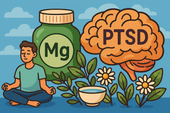
Magnesium and PTSD: Calming the Nervous System
Magnesium is one of the body’s most powerful natural stress relievers. 🌿 Learn how this essential mineral helps calm the nervous system, lower cortisol, ease anxiety, and support better sleep—making it a key ally for anyone recovering from trauma or PTSD.
-
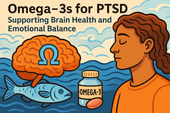
Omega-3s for PTSD: Supporting Brain Health and Emotional Balance
Omega-3s play a vital role in calming the brain and restoring balance after trauma. 🌊 Discover how these essential fatty acids support PTSD recovery by reducing inflammation, balancing neurotransmitters, improving sleep, and promoting emotional resilience—helping your brain heal from the inside out.
-
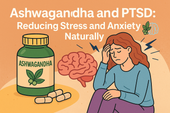
Ashwagandha and PTSD: Reducing Stress and Anxiety Naturally
Ashwagandha offers a natural path to stress and trauma recovery by calming the body’s stress response and restoring hormonal balance. 🌿 Learn how this powerful adaptogen can lower cortisol, ease anxiety, improve sleep, and support emotional resilience for those healing from PTSD.
-
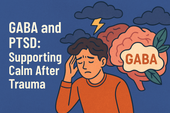
GABA and PTSD: Supporting Calm After Trauma
Therapy helps the brain rewire after trauma, restoring safety and self-trust. 🛋️ Discover how modern therapeutic approaches—like EMDR, CBT, and somatic therapy—help regulate the nervous system, calm intrusive memories, and rebuild emotional resilience for people recovering from PTSD and chronic stress.
-
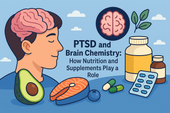
PTSD and Brain Chemistry: How Nutrition and Supplements Play a Role
PTSD isn’t just psychological—it’s deeply biological. 🧠 Learn how trauma reshapes brain chemistry and how nutrition, omega-3s, magnesium, B vitamins, and adaptogens can help rebalance neurotransmitters, reduce inflammation, and support emotional recovery from the inside out.
-

Can Supplements Support Trauma Recovery? Evidence & Insights
Can nutrients like Vitamin D and Zinc really support trauma recovery? 🌞 These two essential micronutrients play powerful roles in immune balance, inflammation control, and hormonal stability—all key systems disrupted by chronic stress and trauma. Learn how replenishing them can help restore strength and emotional resilience.
-
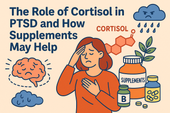
The Role of Cortisol in PTSD and How Supplements May Help
Your adrenal glands play a vital role in how your body responds to stress—but when they’re overworked, fatigue and anxiety can follow. 🌿 Learn how to support adrenal health naturally with nutrients, adaptogens like ashwagandha and rhodiola, and lifestyle habits that restore hormonal balance and steady energy.
-
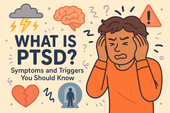
What Is PTSD? Symptoms and Triggers You Should Know
Post-Traumatic Stress Disorder (PTSD) can affect anyone who has experienced deep emotional or physical trauma. 🌪️ Learn how PTSD develops, what symptoms to look for, and the triggers that reignite distress—plus how understanding your body’s response to trauma is the first step toward healing and recovery.
-
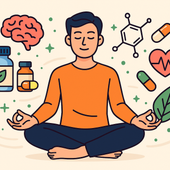
Creating a Daily Supplement Stack for Stress and Cortisol Management: A Science-Based Guide
Building a daily supplement stack for stress and cortisol management can help restore balance, focus, and calm in your life. 🌿 Learn how adaptogens, magnesium, omega-3s, and other key nutrients support your body’s natural stress response from morning to night—so you can feel grounded, energized, and resilient every day.
-
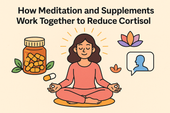
How Meditation and Supplements Work Together to Reduce Cortisol: A Complete Guide to Calming the Mind and Body
Meditation and supplements can work hand in hand to naturally reduce cortisol, your body’s main stress hormone. 🌿 Learn how mindfulness practices, adaptogenic herbs, and nutrient support like magnesium, omega-3s, and B vitamins create a powerful synergy for calm, focus, and emotional balance—backed by science and daily rituals that truly reset your stress response.
-
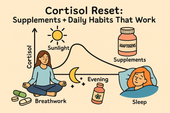
Cortisol Reset: Supplements + Daily Habits That Work
-
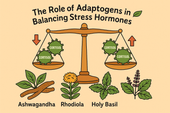
The Role of Adaptogens in Balancing Stress Hormones
Adaptogens work at the root of stress — your nervous system. 🌿 Learn how these powerful herbs help regulate cortisol, calm your nerves, and restore balance between energy and relaxation. ✨
-
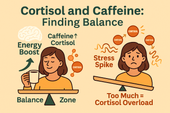
Cortisol and Caffeine: How Much Is Too Much?
Caffeine can boost energy and focus — but too much can overstimulate your stress hormones. ☕ Learn how caffeine affects cortisol, energy levels, and mood, and discover how to find the perfect balance for lasting calm and clarity. 🌿
-
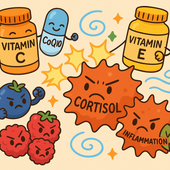
Antioxidants for Stress Management and Cortisol Control
When stress overwhelms your body, antioxidants come to the rescue. 🌿 Learn how vitamin C, CoQ10, and other natural compounds help reduce oxidative stress, regulate cortisol, and restore calm energy from within. ✨
-
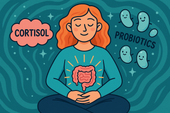
Cortisol and Gut Health: How Probiotics May Help
Chronic stress doesn’t just affect your mind — it changes your gut. 🌿 Learn how cortisol disrupts the microbiome and how probiotics can help restore balance, improve digestion, and calm your stress response naturally. ✨
-

Vitamin D and Cortisol: Supporting Immune Balance
Vitamin D does more than strengthen bones — it helps regulate cortisol and support immune balance. 🌞 Learn how this essential hormone-like nutrient restores calm, improves mood, and strengthens your body’s natural stress defenses. 🌿
-
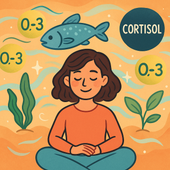
Omega-3s and Cortisol: Fighting Inflammation Naturally
Omega-3s are more than heart-healthy fats — they’re natural cortisol regulators. 🌿 Learn how EPA and DHA help reduce chronic inflammation, calm the nervous system, and support stress recovery from the inside out. ✨
-
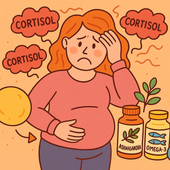
High Cortisol and Belly Fat: Can Supplements Help?
Chronic stress can make belly fat harder to lose — but supplements like ashwagandha, magnesium, and omega-3s may help restore cortisol balance. 🌿 Learn how science-backed nutrients support fat metabolism, calm your stress response, and bring your body back into harmony. ✨
-
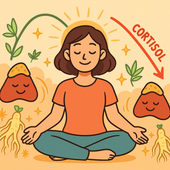
How Ginseng Can Support Energy and Cortisol Balance
Ginseng is one of nature’s most powerful adaptogens, helping your body handle stress without burning out. 🌿 Learn how this ancient root supports balanced cortisol, steady energy, and sharper focus — restoring vitality naturally and sustainably. ✨
-
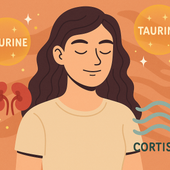
Taurine and Cortisol: Supporting Focus Under Stress
When cortisol surges, focus fades — but taurine helps restore balance. 🌿 Learn how this powerful amino acid calms your nervous system, regulates stress hormones, and sharpens concentration without jitters or fatigue. ✨
-
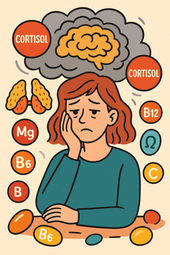
The Link Between Cortisol, Brain Fog, and Nutrient Deficiencies
When brain fog sets in, it’s not just in your head — it’s in your hormones. 🌿 Discover how cortisol imbalance and nutrient deficiencies like low magnesium, B vitamins, and omega-3s can cloud your focus and how restoring balance brings back mental clarity and calm. ✨
-
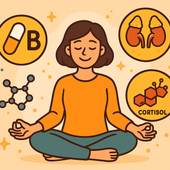
B Vitamins for Stress, Energy, and Cortisol Regulation
B vitamins are the foundation of stress resilience and steady energy. 🌿 Learn how this essential group of nutrients helps regulate cortisol, restore focus, and keep your nervous system calm — giving you balance from the inside out. ✨
-

Cortisol Imbalance and Chronic Fatigue: Can Supplements Help?
When chronic stress keeps cortisol high, fatigue and brain fog follow. 🌿 Learn how to rebalance your stress hormones naturally with calming nutrients, adaptogens, and lifestyle rituals that restore energy, focus, and inner peace. ✨
-

Adaptogen Stacks for Better Sleep and Lower Stress Hormones
Adaptogens can help your body recover from stress and sleep better by regulating key hormones like cortisol and adrenaline. 🌿 Learn how adaptogen stacks work to restore balance, calm the mind, and rebuild resilience — so you can rest deeply and wake renewed. ✨
-

Phosphatidylserine for Nighttime Cortisol Control
When stress hormones stay high at night, deep rest becomes impossible. 🌙 Discover how phosphatidylserine helps calm the brain, reduce nighttime cortisol, and restore healthy sleep rhythms — so you can wake up peaceful, clear, and recharged. ✨
-

Magnesium for Stress Relief and Cortisol Reduction
Magnesium is one of the most powerful natural tools for stress relief. 🌿 This essential mineral calms your nervous system, lowers cortisol, and helps your body recover from chronic tension. Learn how magnesium replenishes balance, improves sleep, and restores inner peace — naturally. ✨
-

Supplements to Improve Sleep by Balancing Cortisol
When cortisol stays high at night, sleep becomes a struggle. 🌙 Discover natural supplements that calm the nervous system, lower stress hormones, and restore your body’s natural rhythm. From magnesium and ashwagandha to L-theanine and phosphatidylserine, learn how to build deeper, more restorative rest. 🌿
-

Cortisol and Sleep: Why Stress Keeps You Awake
When stress keeps your body in fight-or-flight mode, cortisol refuses to calm down — and sleep becomes impossible. 🌙 Learn how elevated cortisol disrupts your circadian rhythm, suppresses melatonin, and turns restless nights into exhaustion. Discover how to restore balance and reclaim deep rest. ✨
-

L-Theanine for Cortisol Balance and Anxiety Relief
L-Theanine — the calming amino acid from green tea — helps quiet the mind and balance cortisol, the body’s key stress hormone. 🌿 Learn how it promotes calm focus, eases anxiety, and supports deep rest without sedation, backed by modern research and centuries of tradition. ✨
-

Rhodiola Rosea and Stress Resilience: A Natural Cortisol Regulator
Rhodiola rosea is one of nature’s most powerful tools for resilience. 🌿 This Arctic root helps balance cortisol, fight fatigue, and sharpen focus — keeping you calm yet energized even under stress. Discover the science behind Rhodiola’s adaptogenic power and how it helps your body thrive under pressure. ✨
-

Ashwagandha for Cortisol Balance: What the Science Says
Ashwagandha helps your body recover from chronic stress by calming the adrenal system and balancing cortisol — your key stress hormone. 🌿 Learn what science says about this powerful adaptogen, how it restores energy and focus, and why it’s one of nature’s most effective tools for modern stress relief. ✨
-

Supplements That Naturally Lower Cortisol Levels
When cortisol levels calm, your energy transforms — no more crashes or jitters, just steady focus and inner peace. 🌿 Learn which natural supplements and habits lower stress hormones, boost calm energy, and help your body thrive with balance instead of burnout. ✨
-

What Is Cortisol Imbalance? Symptoms You Shouldn’t Ignore
Cortisol — your body’s main stress hormone — keeps you alert and energized, but when it’s out of balance, it can drain your health. 🌿 Learn the signs of cortisol imbalance, from fatigue and anxiety to sleep disruption and stubborn weight gain, and discover how to restore calm, energy, and hormonal harmony naturally. ✨
-

The Best Daily Multivitamins for Menopausal Women
Menopause brings new nutritional needs that your old vitamin routine may no longer meet. 🌿 Discover how the right daily multivitamin can boost energy, balance mood, support bone and heart health, and keep your skin glowing. Learn which nutrients truly matter — from vitamin D to magnesium and B12 — to feel strong and vibrant every day. ✨
-

Antioxidants and Menopause: Fighting Inflammation Naturally
During menopause, oxidative stress and inflammation can quietly accelerate aging, fatigue, and skin changes. 🌿 Learn how antioxidants — from vitamins C and E to polyphenols in berries and green tea — help neutralize free radicals, reduce inflammation, and restore balance naturally. Discover the science of radiant, resilient aging. ✨
-

How CoQ10 Supports Heart Health After Menopause
After menopause, heart health becomes more important than ever. ❤️ Discover how CoQ10 — your body’s natural energy molecule — supports cardiovascular strength, restores vitality, and protects against oxidative stress. Learn how this essential nutrient helps keep your heart energized, balanced, and resilient through every stage of life. 🌿
-

Collagen Supplements for Skin and Joint Health Post-Menopause
After menopause, collagen loss affects both skin elasticity and joint comfort — but supplements can help rebuild from within. 🌸 Learn how collagen peptides, vitamin C, and other nutrients work together to restore firmness, reduce stiffness, and keep you glowing and mobile well into your next chapter. ✨
-

Calcium and Vitamin D: Protecting Bone Health in Menopause
Menopause brings hormonal changes that can weaken bones—but with the right nutrients, strength and stability can be rebuilt. 🦴 Learn how calcium and vitamin D work together to protect bone density, prevent fractures, and keep your body resilient. This guide explores nutrition, sunlight, and lifestyle habits that help your bones stay strong and vibrant for years to come. ☀️💪
-

Adaptogens for Energy and Resilience During Menopause
Feeling drained or emotionally scattered during menopause? 🌿 Discover how adaptogenic herbs like Ashwagandha, Rhodiola, and Ginseng can restore energy, balance cortisol, and build emotional resilience. Learn how these natural allies work with your body—not against it—to help you stay strong, focused, and calm through life’s hormonal changes. 🌸
-

Supplements That Help Beat Menopause Fatigue
Menopause fatigue can feel like more than tiredness—it’s a total energy crash. This guide explores how specific supplements, mindful breathwork, and therapy can help restore balance. Learn how nutrients like B vitamins, magnesium, and adaptogens rebuild your stamina, while breathwork and emotional healing calm your nervous system and bring vitality back to your days. 🌿✨
-

Herbal Blends for Menopausal Restlessness: Finding Calm in Transition
Herbal blends bring the wisdom of nature into moments of rest and renewal. Discover how soothing herbs like chamomile, lemon balm, and ashwagandha work together to calm menopausal restlessness, balance hormones, and invite deep relaxation. 🌿💫
-

Magnesium + Glycine for Deep Sleep During Menopause
Nutrients like magnesium, glycine, and B vitamins form the foundation for deep, restorative sleep during menopause. Discover how these natural compounds calm your nervous system, balance hormones, and help you wake up refreshed and recharged. 🌿💤
-

Melatonin and Menopause: Restoring Your Sleep Cycle
Nutrients are the foundation of hormone balance and energy. Learn how vitamins, minerals, and whole foods like greens, salmon, and berries nourish women’s bodies during menopause and beyond — restoring vitality, mood, and strength. 🌿🥗
-

How L-Theanine Helps With Menopausal Anxiety
Science continually deepens our understanding of the human body, from hormones to neurotransmitters. Discover how evidence-based research shapes modern wellness — bridging natural medicine, neuroscience, and hormone balance for healthier living. 🔬🌿
-

Can Ginkgo Biloba Improve Memory in Menopausal Women?
Hormone therapy can be a powerful tool for easing menopause symptoms and restoring balance. Learn how it works, the types available, and how to combine it safely with lifestyle and natural support for optimal well-being. 🌸💊
-

B Vitamins for Mental Clarity During Menopause
Nutrients are the foundation of mental and physical balance during menopause. Discover how vitamins, minerals, and whole foods like leafy greens, fish, nuts, and citrus can fuel energy, clarity, and calm while supporting hormonal health. 🌿✨
-

Mood Swings and Menopause: Natural Nutrient Support
Probiotics do more than support digestion — they help balance mood, hormones, and immunity too. Learn how a healthy gut microbiome can ease menopause symptoms, boost energy, and improve emotional resilience naturally. 🌿🦠
-

Brain Fog in Menopause: Supplements That May Help
Supplements can be powerful allies in restoring balance, energy, and focus—especially during menopause. Learn how nutrients like omega-3s, vitamin D, magnesium, and herbal adaptogens work together to support brain health, reduce stress, and promote lasting vitality. 🌿💊
-

Adaptogen Stacks for Reducing Night Sweats
Hormone detox isn’t about cleansing your body—it’s about restoring flow. Learn how the liver, gut, and endocrine systems work together to eliminate hormone buildup and how herbs like milk thistle, dandelion, and schisandra support balance, clarity, and natural vitality. 🌿💫
-

Cooling Menopause Symptoms with Herbal Support
Ashwagandha is one of nature’s most powerful adaptogens, helping women manage stress, sleep better, and balance hormones naturally. Discover how this ancient root supports calm energy, emotional resilience, and relief from menopause-related anxiety and fatigue. 🌿💫


















































